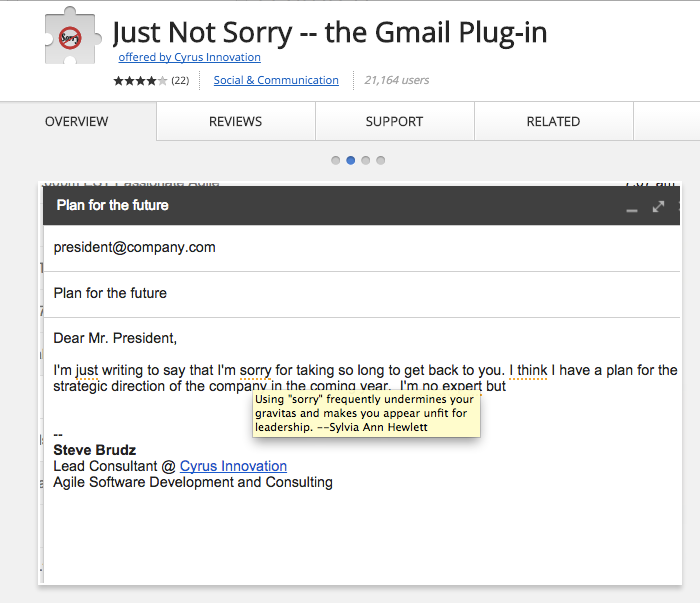A lot of people want to help women succeed in the business world lately, which is an awesome trend to see.
There are an ever-growing number of programs and initiatives focusing on everything from getting girls interested in coding to getting professional women into leadership roles.
One interesting offshoot of this trend has been an emphasis on language and speech—it feels like more and more well-meaning people are giving thought to the words women should say (and not say), and how they should say them.
I’ve been thinking a lot about a few of the phrases that seem to come up quite a lot in the “don’t say” column, like:
- “Sorry”
- “Just”
- “I think”
- “Does that make sense?”
Using phrases like these, some career coaches might tell you, can undermine your knowledge, make you look less confident and minimize your contributions to a team.
Now there’s even Just Not Sorry, a plugin for Gmail that highlights “undermining words” you type, including “just,” “sorry” and others.

Its creators have a really heartfelt, awesome explanation for why this tool felt important to them to create:
“When someone uses one of these qualifiers, it minimizes others’ confidence in their ideas. Whether you’re persuading an investor to provide funding, announcing a change in direction to your colleagues, or promoting your services to a client, you are building their confidence in you.”
I absolutely understand this reasoning, and it makes sense that this is the attitude that’s necessary for success in many (most?) modern work environments.
Here’s the feeling all this advice gives me. If women want to lead, they need to “man up.” Be direct. Decisive. Bold. No-doubt-about-it statements only.
But wait…does this have to be what leadership looks like?
What would it look like if we stopped telling women to harden their language, and instead encouraged everyone to start softening it?
I think I have an inkling of what that could be like, and it’s a pretty great world to work in.
Suggestive, not authoritative
At Buffer, we take the opposite path. It’s coded right into our value of listening to deliberately focus on language that’s suggestive instead of authoritative:

It’s rare to hear words like “definitely” or “I know” in our Slack chatrooms or videochat discussions. You’re far more likely to hear:
- “Maybe we could …”
- “I wonder if …”
- It’s my intuition that…
- I sense that we could possibly…
- Might it work to…
In other words, all those phrases that women are being encouraged to take out of their vocabulary to be successful? They’re exactly the ones that we believe help make our team strong.
6 times we were sorry
I wanted to make sure we were actually living our value here and not just paying lip service to it, so I searched our Slack and Discourse discussions for some examples of “just,” “sorry” and other softening language (from both genders).
Here are 6 times we were sorry, or “just” wondering something:
Sorry for dumping our thoughts out

Just wanting to flag an issue

Sorry for a long reply

Just putting it on the radar

Sorry for sharing to the whole team

Sorry about the confusion; just making sure

Some people might read these examples and conclude that we spend a lot of time apologizing, qualifying and deferring to one another. They would probably be right.
Maybe it’s because we’re an entirely remote team, working around the world with all kinds of beautiful language and cultural differences. We work hard to be clear and positive in our communication, and create a welcoming and collaborative environment.
Does it take longer to work and communicate this way? Definitely. Is it worth the extra effort? We think so.
In fact, we apologize so much that this awesome cartoon by Yao Xiao about saying “sorry” when you really mean “thank you” really resonated with many of us.
At Buffer, “sorry” is perfectly acceptable because softness is OK and encouraged. Now we’re learning that “thank you” might oftentimes be even better. (It’s a good thing we treat everything as a hypothesis and remember we could always be wrong!)
A few benefits of softer language
Using softer, more giving language might not be the right way for everyone, but it works well for our team so far. A few big benefits I’ve noticed:
- We don’t always have to have the answer
- We can be wrong without being embarrassed
- We can ask “silly” questions without fear
- We can have time to reflect when we need it
- Even introverts can feel empowered to share thoughts
- We never have to give or take orders
- We can get more input without pressuring anyone
How do you feel about this?
It’s not our goal to get the whole business world to come around to our way of thinking (remember, we might be wrong!).
I guess I just wanted to share a different viewpoint and let you know that—man or woman—if these phrases are part of your vocabulary, you can still have a great career—maybe even at Buffer!
Sorry for going on so long here :)
I’m super curious to hear your thoughts and feelings on this! Please share with me in the comments!
Try Buffer for free
190,000+ creators, small businesses, and marketers use Buffer to grow their audiences every month.



